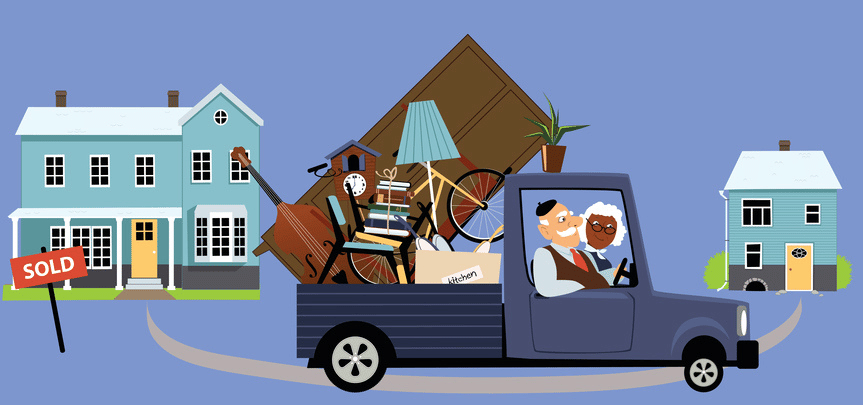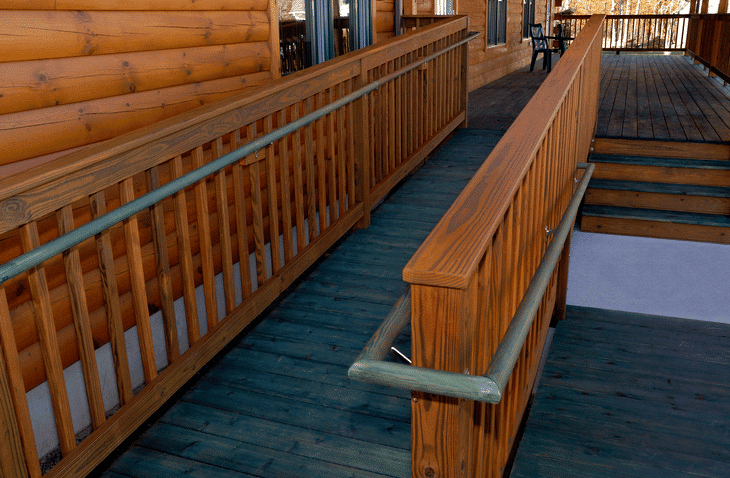For most people, aging brings a new set of challenges. New health problems may affect your ability to live independently, financial challenges make it tougher to maintain your lifestyle and adult children moving to faraway places may make you feel less connected to your home.
Some people move every few years or even more frequently, while others remain rooted in the same location for decades. But for many people, there comes a time in old age when it becomes necessary to move.
While relocating is never easy, moving as a senior carries its own difficulties. If you or a loved one is moving into an assisted living or memory care facility due to declining health, the very reason for the move will likely make the process even more difficult. A lifetime of accumulated possessions might be squirreled away in your home. And if the move is due to financial stress, moving itself can be expensive.
There are many ways to make a move go more smoothly. Knowing when to move, making the right choices about having a family member move in with you and doing a little advanced planning for a new home and reducing the load beforehand can significantly reduce the stress involved. Read on to learn about downsizing and senior moving so you can make the best choice for your family.
Signs It’s Time to Downsize Your Home

Over the years, you may have felt like your home’s footprint just wasn’t big enough. Whether the closets were too small or the number of cabinets too few, you may have dreamed of relocating to a larger space. But as a senior, that once-too-small abode might be more space than you need or want.
At the same time, the sentiment of moving away from the home where you raised your family or planted and cared for a garden for decades pulls at your heartstrings, leaving you unsure about whether or not downsizing is the right decision.
Anytime safety or physical limitations like the inability to use stairs exists, it’s time to consider relocating. But there are a few other less obvious indicators that seniors should downsize, too.
1. There are unused rooms
Jamie Novak, a professional organizer and author of “Keep This, Toss That,” says having rooms you rarely—or never—enter unless it’s to air them out or vacuum now and then is a sure sign it’s time to downsize. Sure, having a bit of extra space to stash trinkets and holiday décor is handy. But maintaining a large house with multiple unused bedrooms goes beyond having an extra closet or cubby.
“All that unused space is room you’re paying to heat or cool, paying taxes on and have to clean and maintain,” says Novak. “And that can be a lot of resources spent for nothing.”
2. There is too much maintenance work
“It shouldn’t be difficult to keep up with the maintenance of the home,” says Novak. Granted, no one expects you to look forward to tasks like mowing the lawn or giving the fence a fresh coat of paint. But if these and similar projects are becoming physically difficult to complete, it’s probably time to discuss options that require less upkeep.
“Additionally, having to pay for help to accomplish the tasks is another indicator that it might be time for a smaller space,” says Novak.
3. You’re too far from family
Not able to take in as many of your grandkids’ soccer games or dance recitals as you want? “If you feel isolated in your home, are too far from family or assistance, or all your friends have moved away, then you might want to downsize and move closer to loved ones,” suggests Novak.
4. Your home is cluttered
If you’re constantly hunting down gadgets, gizmos and more that you’ve stashed in the basement, attic or back of a closet, Novak says you might have too much stuff. “It’s tempting to hang on to every piece of memorabilia or want to fill up all the empty corners of a large home to make it feel less open.”
But having too many odds and ends is a clear sign you’ve got too much space to fill. “And downsizing will force you to pare down and prioritize what you actually need to hang on to,” adds Novak.
5. Your home has increased in value
Your home’s value may have appreciated to the point where it’s more profitable to cash it in than hang onto it. Novak suggests consulting two to three realtors to have a market analysis performed and explore both your selling and buying power.
What to Look for In a New Home

Once you’ve made the decision to downsize, you should consider many factors in choosing a new place to live, including safety features, convenience, and whether your abilities may decrease and care needs increase over time.
But no matter what amount of space you downsize to, the feel is what’s most important, says Rob Krohn, the franchise marketing manager at Epcon Communities, a builder of 55-plus communities. He cautions against settling for a property that doesn’t feel comfortable.
“You want your new, downsized space to feel like home, even if it’s smaller than what you’ve be used to for years,” he says.
Below, we outline some of the top things you should consider when looking for a new downsized home for yourself or an elderly loved one.
Convenient Location
Of course, you want to be near family members or reliable friends. But you also want to look for a new neighborhood that, if possible, is close to amenities and services like physicians, shopping and restaurants.
Opportunities to build your social network near your new home is another important consideration. A community that promotes a more active lifestyle is a bonus, says Krohn. When you have walking trails, a park, a pool or a community center, you’re more likely to get out and enjoy life in your area.
Minimal Stairs
Krohn notes that even if they’re not a problem today, having to navigate stairs can become a burden as you age.
“Even an entryway with a few stairs should be avoided when you’re looking for a long-term home,” he says. “Look for the opportunity to choose or add a no-step entry that is level, so there is no uphill climb.”
As you walk through any home you’re considering, imagine trying to navigate the spaces in a wheelchair. Are there thresholds to cross? Wheelchairs require a minimum of 32 inches but 36 inches is recommended. Hallways should be at least 36 inches wide. If possible, there should be extra floor space so a wheelchair can turn around. It takes about 60 inches of space for someone in a wheelchair to make a 180-degree turn.
If you’re in a home with stairs at the entrance, you may need to put in a ramp. They start at about $400 for a 4-foot ramp that’s 36 inches wide; an 8-foot ramp is about $800. If your home does have stairs, a chair lift is another option, which would generally cost between $1,500 and $4,000, or a home elevator, which could cost $15,000 or more.
Modification-Friendly Bathrooms
Think about the personal care needs of your bathroom. Even though you may have no trouble walking right now, could you get into the shower or on the toilet from a wheelchair or with the aid of a walker? “A roll-in shower and an elevated toilet — both with grab bars — provide a long-term solution,” says Krohn.
Consider the height of the countertop for today and tomorrow. “If down the line you or your spouse require a wheelchair-accessible home, vanities with a lower sink and room for the chair to fit underneath might be options to consider if building a new home or remodeling a space,” says Krohn.
Grab bars in the tub or shower and beside the toilet are inexpensive ($40 to $140) and potential lifesavers. Likewise, low-cost no-slip adhesive strips decrease the risk of slippery bathroom areas and steps.
Also consider a walk-in bathtub, with a door that opens so you don’t have to step over the side to get into the tub, or a bath lift, where a tub-level chair lowers you into the tub.
An anti-scalding device could also be useful for preventing accidents. These inexpensive devices (about $40) automatically turn off the water if it gets too hot. They can easily be installed in the bathroom sink, shower, tub, or kitchen sink. An alternative solution: Turn down the thermostat on your hot-water heater so the water never gets above 120 degrees Fahrenheit.
Spacious Bedroom
A hospital bed or adjustable bed could make you much more comfortable. These enable you to raise or lower the head and knee area of the bed, as well as the level of the entire bed, either electronically or through the use of hand cranks. The flexibility of these beds makes life easier and more comfortable for someone who’s ailing. They generally cost $500 and up.
A walk-in closet with no threshold is essential, but you should also be able to adjust storage space — like shelves that can be moved to a lower position, if necessary. You’ll also want light switches that you can reach from your bed.
What to Consider Before Moving an Aging Loved One into Your Home

For some seniors who need to downsize, it may not make sense for them to move to another home by themselves. If you decide to move an elderly parent or another aging relative in with you, you won’t be alone. An increasing number of older adults are moving in with their children for a myriad of reasons, including safety, finances, and comfort.
This arrangement can have many positives. If your parent or other loved one is still relatively healthy, they may be able to babysit or otherwise help around the house, contribute financially, and get to know your children in a way that would never be possible with only occasional visits.
But it’s not right for everyone. It may be cheaper than putting the person in a nursing home (which costs about $93,000 per year on average) or an assisted living facility (about $51,000 per year on average), but you could pay a heavy price in terms of time, stress, fatigue, and strained relations.
Take the time to consider the following questions when deciding whether to have a loved one live with you.
1. What kind of care will your loved one need?
The first questions you need to answer relate to your loved one’s health and needs. If they are still relatively healthy and independent, this may be the ideal time to move them in. They can become accustomed to their new surroundings and will initially require little care from you or other family members. Your kids will get to know them while they’re still healthy.
Most people don’t consider caring for an elderly parent in their own home until they have some sort of health setback or crisis. In that case, it’s very likely you’ll be coping with the person’s chronic illness. “Know the illness very well,” says Donna Schempp, the program director for the Family Caregiver Alliance in San Francisco. “And not just the illness here and now. Where’s this illness going to be six months, a year, two years, and five years from now? What are his care needs going to be now and in the future? You need that information.”
Even if an aging family member is just slowing down and there’s no specific illness such as Alzheimer’s or cancer to deal with, you still need to anticipate their future condition based on family history or personal history. Bringing someone to your home as an interim solution is also viable. It may be that they can live with you until their condition deteriorates to a point where they need assisted living or memory care.
Start with a medical consultation. Before you make any major decisions about home care, the person’s doctor should weigh in. The doctor can tell you what kind of care they will need and whether it’s practical for them to live at home.
2. Do you have enough room?
If you’re moving someone in you’ll need a bedroom, or at least a comfortable place for them to sleep or rest. If you don’t have a spare room, can you move family members or furniture around to make space? Is it feasible to build an extra room or an in-law apartment? Talk with them beforehand about what the arrangements would be.
Consider space for equipment or supplies. Do you have room for a hospital bed (which is bulkier than a regular bed), commode, oxygen tank, or other medical equipment if needed?
Think about accessibility issues. Do stairs and narrow hallways make maneuvering a wheelchair or walker difficult or impossible?
3. How much assistance and supervision can you provide?
Realize that the level of assistance your loved one needs will most likely increase over time. Be realistic about what you can and can’t do.
Know your limits. If the person needs help with bathing, dressing, or going to the bathroom, are you comfortable helping? If they’re incontinent and the idea of changing a diaper makes you uncomfortable, you may need to find an in-home aide. On the other hand, maybe they’re just becoming more forgetful, and you’re really good at organizing their medications and helping them make sure to take them. Or perhaps you’re good at paperwork and can cut through red tape and help with their Medicare or health insurance forms.
Consider your schedule. If you have a full-time job and young kids at home, consider the impact of taking in someone who needs a lot of assistance. If, for example, they need help getting to the bathroom several times every night, you could soon be suffering from a major case of sleep deprivation. You may be reacting to a health crisis they recently had, or thinking about the move as a preventive measure because they’re slowly losing the ability to take care of themselves. In either case, think about whether you have the time and energy to take this on.
4. How well do you get along?
Look at the history of your relationship with your family member. If you enjoy each other’s company and can successfully resolve your differences, that’s a real plus. That doesn’t mean you can never argue or you have to be best friends.
All families have some conflict, and if both of you can get over it quickly or simply agree to disagree, then you’ve already done much of the groundwork. You may also be able to bond with them in a new way and forge a happier new relationship as an adult. Your children will have the opportunity to get to know their grandparent or other family member better, or perhaps for the first time.
If the two of you have never really gotten along, don’t expect the relationship to change magically now. When they visit you, if you’re grinding your teeth after an hour and feel like running out the door, then having them move in may not be a good idea. You may feel you’re doing the right thing, but if you’re both going to be uncomfortable, it’s probably wiser to pursue other options first.
5. Does caregiving fit your daily routine?

Consider your work and leisure activities. Do you have wiggle room in your schedule? Are you OK with cutting back on your activities if necessary, including volunteer work or what you do for fun?
Will you be able to manage getting your loved one to medical appointments, to the senior center, or to visit friends and relatives? Will you need to drive them everywhere or can they use public transportation or paratransit? Are there reliable senior transportation or paratransit services your area?
It’s important to remember that there’s rarely one perfect solution for providing daily care. For every family it boils down to weighing and balancing many factors to settle on the best option. Most families adjust to change over time.
6. Will your family member contribute financially?
There’s no single right or wrong way to handle finances. Your family needs to decide what will work best for everyone. Come to a financial agreement with your family member before making the decision to have them move in. This won’t necessarily be easy, because money is an emotionally charged subject in most families. To avoid problems or resentments later, have open discussions about this upfront.
By pooling your resources, you might come up with a better living arrangement for everybody. Using the financial resources of both of you, you may be able to get a home that’s much more comfortable than either of you could afford alone.
Will you have to cut back on your work hours or other commitments? In some cases, providing home care is only possible if you, your spouse, or another family member leaves a job, works reduced hours, or gives up other commitments. Can your family afford that?
Consider paid caregivers. Caring for someone in your home is sometimes only possible with the help of paid caregivers, which can be expensive. Factor this into your budget or the budget of the person you’re caring for.
Find out if you can get paid for the care you provide. Is your parent eligible for Medicaid? If so, you may be able to get a paycheck for the care you provide to them. Most states have a Cash and Counseling program that allows eligible elderly adults to “hire” a caregiver, which could include an adult child or other relative, for the care they are provided. The chosen caregiver usually receives an hourly rate that is less than the state’s hourly average for home care.
7. Will you and your family be able to adjust?
Think about meals, noise levels in the house, what’s on the stereo. Will everyone’s preferences and styles be compatible?
If you have a teenager who’s used to making noise and playing loud music but Grandpa needs quiet at night, perhaps your teen can adjust by using headphones after a certain hour.
If quarters are cramped, it may take a while to adjust to the loss of privacy and personal space. On the other hand, if you’re able to pool your resources and move everyone to a new, larger home, it can be a win-win situation for everyone.
Your family may have to put off some vacations and leisure activities to take care of your parent or relative. If so, this is a chance for your kids to learn the importance of making sacrifices, however difficult, for the greater good of the family.
8. Will your elderly relative have a social network available?
If they’re moving a long distance to live with you, they’re leaving their social network and friends. Most caregivers drastically underestimate how hard it is and how long it takes for someone to adjust to a new environment in a new town.
If you and your spouse are at work and the kids are at school, that could mean a lot of alone time for your elderly parent. Rather than have them sit at home alone all day, you’ll want to find out whether there’s a senior center or adult day care facility nearby. These places may offer personal care such as exercise and even transportation, and provide cultural activities such as art or photography classes or trips to museums. Likewise, senior centers can provide a great social network and generally are free or have very low annual membership fees.
Safety Considerations and Home Modifications
If your loved one is moving in with you or into a new independent space, it’s a smart move to “elder-proof” the house to make it safer for an aging adult. Not only can taking these steps and making modifications prevent nasty accidents, it will also make life a lot easier and more comfortable for them.
Some fixes are easy and inexpensive — grab bars in the bathroom and nonslip mats under throw rugs, for example. If they’re less mobile and your home has stairs, you may decide to put in a more expensive ramp or stair-lift. And all sorts of devices — from easy-opening door handles to walk-in bathtubs — are available to make their life in your home much more manageable.
Here are some other safety and comfort improvements you may want to consider:
| Modification or Device | How It Helps |
| Personal Emergency Response System | If you’re going to be out a lot and worry about your loved one being alone, you can sign them up for a personal emergency response system, or PERS. These medical alert systems enable an older adult to summon emergency help with the push of a button. A live operator at an emergency response center will respond to the call, sending a paramedic or ambulance, if necessary, or, if it’s a minor problem, contacting you or a neighbor to check in on them. |
| Walk-In Tubs or Showers | The bathroom is one of the most dangerous rooms in the house for seniors due to its hard, slick surfaces. Showers and bathtubs that require a high step to get in or out can increase the risk of falls for seniors. Consider installing a walk-in tub or walk-in shower that make it easier for your loved one to get in and out safely. |
| Door and Window Sensors | If your loved one has Alzheimer’s disease and tends to wander off, you may need either special door locks that will keep doors shut or chimes to alert you to their attempts to leave the house. Window sensors with remote alarms are also available. |
| Accessible Shelving | As people get older, the simple act of bending down or reaching up can become an ordeal. If possible, put extra shelves in closets, pantries, or cabinets at heights an older adult can reach without a struggle. If they’re in a wheelchair, or you anticipate they may be soon, adjustable brackets will enable you to change the height as needed. |
| TV Silencer | For older adults with hearing problems, this device automatically mutes the TV, stereo, or DVD player whenever the phone rings, so they won’t miss important calls. |
Tips for a Low-Stress Senior Move

Over the past two decades, increasing attention has been paid to relocation stress syndrome (RSS), which is also known as transfer trauma. RSS is a formal nursing diagnosis characterized by a combination of physiologic and psychologic disturbances that occur as a result of transferring a person from one environment to another.
Symptoms of relocation stress syndrome include exhaustion, sleep disturbances, anxiety, grief and loss, depression and disorientation. In seniors, these symptoms are exacerbated by dementia, mild cognitive impairment, poor physical health, frailty, lack of a support system, and sensory impairment. For these seniors in particular, the resulting confusion, depression and agitation have led to increased falls, undesirable weight loss and self-care deficits.
Although initial studies on RSS focused on outcomes of individuals moved to nursing homes and assisted living facilities without their involvement or consent, it is now generally understood that RSS can affect those who have chosen to move, been involuntarily relocated, or been placed in a care facility for mental or medical needs.
Studies have shown that certain actions are successful in minimizing RSS. These actions, which can be undertaken by family members, are all hallmarks of senior move management.
Tips for a successful senior move include:
- Involving the senior in the decision and planning process.
- Providing the senior with an opportunity to ask questions and discuss his or her concerns.
- Honoring the individual’s preferences and allowing him or her to maintain control.
- Paying attention to details and maintain the senior’s daily routine as much as possible.
- Safeguarding the senior’s personal possessions.
- Involving the senior in setting up the new room or apartment.
- Making the new home resemble (as much as possible) the old home.
Get Help From Senior Move Managers
Senior move managers help plan and manage a move of any distance, such as from a longtime home to a communal living situation. They hire and supervise movers, help sort and pack belongings, and unpack at the new home.
Senior move managers don’t just handle the time-consuming (and often backbreaking) logistics; they have expertise in navigating the tricky emotional terrain that’s involved with someone who has accumulated a lifetime of possessions. Caregivers who work or whose older loved ones live far away find such services especially useful. You can also hire a senior move manager to help downsize possessions if a loved one is moving in with you (or vice versa) to accommodate multiple generations under one roof.
They’re especially useful for those who have decades’ worth of accumulated belongings, whose health is frail, or who don’t have adult children nearby.
Prices vary widely. Some senior move managers charge by the hour (usually $25 to $75, depending on the region) or by the job; a full-service move can cost as much as $2,500.Visit the National Association of Senior Move Managers to find a move manager near you.
